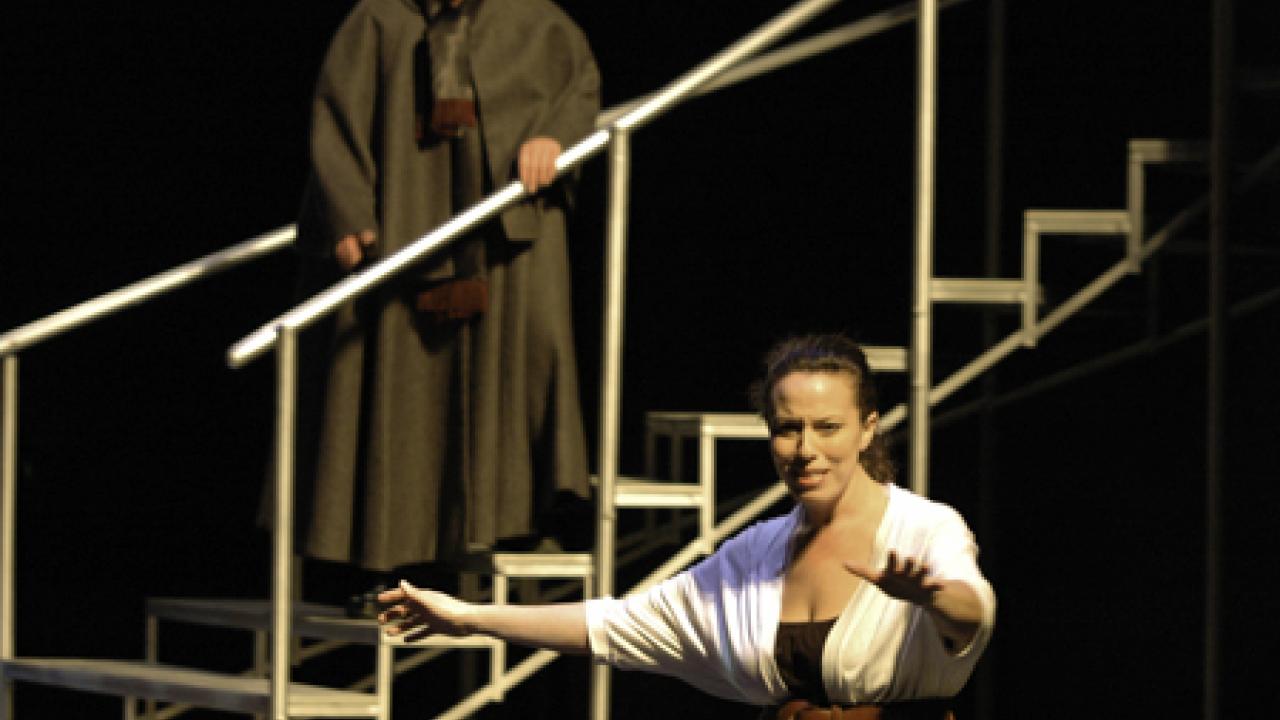Jackson Hall is being transformed into a royal residence for a full staging of the rarely performed Bluebeard’s Castle, Béla Bartók’s only opera — with the UC Davis Symphony Orchestra, led by Christian Baldini, providing the music, and the Department of Theatre and Dance handling the set, lighting, costumes and direction.
San Francisco-based bass Gregory Stapp has been signed to sing the lead, Duke Bluebeard, while soprano Jessica Medoff of New York will play his wife, Judith.
The symphony, according to a news release, is using orchestral parts from a recent authoritative edition prepared by Peter Bartók, the composer’s grandson. To date, only the Boston Symphony Orchestra and the Los Angeles Philharmonic have used this edition.
Only two performances are scheduled: next Friday and Sunday nights, Feb. 25 and 27. Bluebeard’s Castle will be sung in English, as opposed to the opera’s original Hungarian, and supertitles will be displayed in English. See At a Glance below.
A very large set
Professor Peter Lichtenfels, known for his expertise in Shakespeare’s works, is the stage director, along with Professor Bella Merlin (recently seen in her one-woman play, Tilly-No-Body: Catastrophes of Love). Professor John Iacovelli designed the (very large) set and the costumes.
The lighting is from Professor Thomas J. Munn, who has designed many productions for the San Francisco Opera and other companies.
Meanwhile, music faculty and students have been attending to the score.
Bluebeard’s Castle is Baldini’s first opera at UC Davis since he became the Symphony Orchestra’s music director and conductor almost two years ago, but he has been in the pit before — conducting Benjamin Britten's The Rape of Lucretia at the Aldeburgh Festival in England in 2009.
Beth E. Levy, associate professor of musicology, has been
teaching a winter quarter course on Bluebeard’s Castle, and composers have been studying the work's orchestration and attending rehearsals.
The orchestration is relatively large, and features extra instruments, such as harp, celesta and xylophone, in addition to the traditional winds, brass, string and percussion instruments. (Jackson Hall, by the way, was specifically designed for larger "opera" orchestras like the one required for Bluebeard’s Castle.)
Small cast, one act
The Bartók work features a cast that is small by opera standards: the two principals, Duke Bluebeard and his wife, along with three undergraduate students as other wives of Bluebeard’s.
The opera is in one act, and it is a relatively short one at that — which means that a lot happens in a short time. Based on the fairy tale of the same name (by Charles Perrault), Bluebeard’s Castle begins with a bard’s prologue — in which time and place are vaguely established.
As the bard says: “Ancient fable, what does it mean, ladies and gentlemen? ... Where is the stage? Outside or within?”
The set’s centerpiece is a large interior wall with a wrapped staircase leading to the top of the wall. Also featured: seven doors leading to rooms and others parts of the castle.
Judith, after being introduced to the castle for the first time, opens each door one by one, to bring light into the place. Instead, each door reveals a dark secret about her husband, including a vision of his former wives (though it is unclear whether they are still living or not).
The stage action follows the score, and simplicity is key, as the
opera asks its audience to define the time and place — and sometimes the emotion.
Bartók wrote music for the stage in only two works, both to a
libretto by Béla Balázs. Bartók composed Bluebeard’s Castle in 1911, and it was first performed in 1918. He wrote his other stage work, The Wooden Prince, a sort of dancing play, from 1914 to 1916, and it was first performed in 1917.
Philip Daley, publicity manager for the Department of Music, contributed to this report.
AT A GLANCE
WHAT: Bluebeard’s Castle, one-act opera by Béla Bartók, fully staged by the departments of Music, and Theatre and Dance. Sung in English, with supertitles in English.
WHEN:
- Friday, Feb. 25 — 8 p.m.
- Sunday, Feb. 27 — 7 p.m.
WHERE: Jackson Hall, Mondavi Center for the Performing Arts
TICKETS: $35/25/15 for adults, $17.50/$12.50/$7.50 for students and children, available through the Mondavi Center box office, (530) 752-2787 or (866) 752-2787, or mondaviarts.org.
The Department of Music presents four concerts in March.
More from the Department of Theatre and Dance: Body of Knowledge, Come Hell and High Water.
Media Resources
Dave Jones, Dateline, 530-752-6556, dljones@ucdavis.edu
